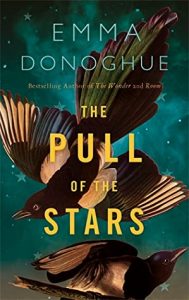“They were mirrors in a way. Both of them watching their loved ones suffer. Both unable to help in any meaningful way. Both coping—one with work and the other with a list. Both scared shitless of hurting the other one.“
Content Warnings: Terminal illness, chronic illness, misogyny, toxic relationship, grief, traumatic brain injury
ER nurse Olive Murphy’s fear of flying doesn’t stop her from getting on a plane to honor her brother, but it seems her fear is misplaced. A medical emergency forces Olive to leap out of her seat and into action, only for the flight to get redirected. She would have missed the marathon she was meant to run at Disney if not for Allied Airlines pilot Stella Soriano: a gorgeous, type A woman who captivates Olive with a glance. They share a magical day at Disney together as the video of Olive saving a man’s life goes viral (after all, she did TECHNICALLY save Mickey Mouse), prompting an uptick in positive press and sales for the airline. Stella sees it as an opportunity to earn her long-deserved promotion and asks Olive to play the role of her fake girlfriend as they generate more press. Can Olive stand playing a fake role when her heart is already on a one-way flight?
Get ready for a sassy, steamy, sapphic love story bound to soar into your heart. Andie Burke’s debut novel has a little of everything; an insta-crush, fake dating (complete with a binder full of rules and research!), sharp and witty banter, plus some real and raw mental health rep. Between their anxieties, family responsibilities, and messy emotions, both Olive and Stella are relatable main characters you can’t help but fall in love with. Sparks fly from the moment Olive and Stella meet, and Olive’s mega-crush is adorable without making her seem adolescent. We gain a lot of insight into both characters’ lives despite the fact that the story sticks with Olive’s point of view, which isn’t always an easy feat. The prose is descriptive but not overly flowery, but it’s the character development that really flies off the page. I absolutely adored Olive’s best friend, too (imagine Felix from Orphan Black).
Burke does a wonderful job of normalizing mental health conditions without it being the main focus. Olive’s symptoms are as much a part of her as the heart-eyes she wears when Stella is in the room. After her (toxic) ex broke up with Olive because her anxiety disorder and panic attacks were “too much,” Olive is afraid her symptoms will eventually scare Stella away. Meanwhile, Stella’s responsibilities as her father’s caretaker (who has Parkinson’s) create the cracks in her type-A facade and show us why she’s so committed to earning her promotion. Both characters encounter misogyny as well. While some readers might feel that there’s too much going on, Burke carefully stacks these issues atop of one another. That’s life; we’re all juggling multiple conflicts, both internal and external. Read the quote I selected again. These women are mirror images of one another. Their struggles, while different on the surface, make it all the easier for them to empathize with and support each other. There’s also no perfect, easy solution to the problems these women are facing because, again: that’s life.
A part of me does wish this story split the POV, allowing us to see Stella’s perspective. Keeping the focus on Olive ensured Stella’s feelings for her remained hidden, but…come on. We all know where a sapphic romance novel is bound to end: with a sapphic romance. The “fake dating girlfriends with benefits” situation is where the story really gets messy. It’s difficult to believe that Stella doesn’t have romantic feelings for Olive at that point. The miscommunication trope is still my least favorite, but it lingers much too long in this one, leading to a not-at-all surprising third-act breakup. Even so, this remains the best sapphic romance I’ve read so far this year.
Recommended to fans of the fake dating trope, serious character development, and a heart-eyed, healing main character.
✨ The Vibes ✨
✈️ Fake Dating
✈️ Bisexual Main Character
✈️ Sapphic Ship
✈️ Panic Attacks/Depression/Mental Health Rep
✈️ Debut Author
Major thanks to the author and publisher for providing an ARC of this book via Netgalley. This does not affect my opinion regarding the book.



